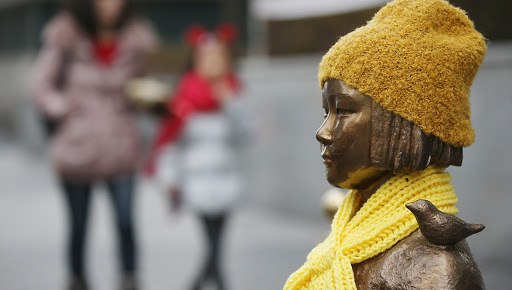Harvard professor urged to offer apology for 'comfort women' claims
By Ahn Sung-miPublished : Feb. 21, 2021 - 15:20

A controversy surrounding a Harvard professor who wrote a journal article depicting victims of Japan’s wartime sexual slavery as voluntary prostitutes continues to escalate, with scholars, politicians and students demanding apologies and a retraction.
In the paper, titled “Contracting for sex in the Pacific War” and published online in the International Review of Law and Economics, Mark Ramseyer, Mitsubishi professor of Japanese legal studies at Harvard Law School, argued that Korean “comfort women” -- as they are often euphemistically labeled -- were part of Japan’s licensed prostitution system.
His arguments contradict the testimonies of survivors, who say they were either coerced or tricked into sex slavery, and the work of scholars who support their movement. Scholars estimate that between 170,000 and 200,000 women and girls were forced to work in Japan’s military brothels before and during World War II, and the UN acknowledges that this occurred.
Ramseyer’s claim has brought about serious debate in academia, with two fellow Harvard history professors releasing a joint statement last Thursday refuting his paper as groundless and asking the journal to retract it.
Japanese history scholar Andrew Gordon and Korean history scholar Carter Eckert said they were working on a critical response to Ramseyer’s article at the request of the editor of the International Review of Law and Economics.
Gordon and Eckert were “initially appalled” by Ramseyer’s “elision of the larger political and economic contexts of colonialism and gender in which the comfort women system was conceived and implemented, and the multiple and brutal ways in which it affected and afflicted the women on a human scale.”
The two professors then raised issues with Ramseyer’s lack of citations and evidence in his paper, which explained the comfort women system based on a comparison of contracts. The pair said Ramseyer had not consulted any actual contracts signed between Korean comfort women and recruiters in Korea, but had only used Japanese contracts, giving readers the impression that “such contracts were the same as these contracts with these Japanese women.”
“In addition to the absence of contracts, he offers virtually no documented third-party statements, oral or written, about contracts with Korean women,” they said. “We have written to the journal requesting they suspend publication of this piece, conduct its own inquiry drawing on expert opinion, and pending the result, retract the article.”
Alexis Dudden, a University of Connecticut professor of Japanese and Korean history, said she also wrote an article rebutting Ramseyer’s piece at the request of the International Review of Law and Economics.
“It is a poorly resourced, evidentially fatuous piece of scholarly production,” Dudden said in an interview with the Harvard Crimson earlier this month. “It is conceptually misguided, because he’s not understanding not only the context, but what actually happened.”
When reached by The Korea Herald for comment earlier this month, Ramseyer declined to address the controversy surrounding his article, saying, “I’ll let the article speak for itself.”
As the public fury continued, the journal issued an “expression of concern” to “inform readers that concerns have been raised regarding the historical evidence” for the article.
“These claims are currently being investigated and the International Review of Law and Economics will provide additional information as it becomes available,” it said.
The paper has been online since December and the print version is slated to be available in March. But the publisher decided to temporarily delay the publication, according to the Harvard Crimson, to include the “expression of concern” and comments regarding the article in the same March edition. The journal still plans to publish the paper.
Politicians both in the US and Korea have also condemned the professor’s paper, including US Rep. Young Kim, who said on Twitter that Ramseyer’s arguments were “untrue, misleading, and disgusting.”
She also said his claims were offensive to victims, urging him to apologize and adding that “we must support victims of human trafficking and slavery, not tear them down.”
Song Young-gil, a Democratic Paty of Korea lawmaker and the chair of the National Assembly Foreign Affairs and Unification Committee, said Friday that he had sent a letter to Harvard University President Lawrence S. Bacow, urging the university to take action against Ramseyer’s paper.
Song said Ramseyer had distorted history by generalizing about “comfort women” as if they were prostitutes, and that the paper omitted the fact that the victims were forced or tricked by the Japanese military.
The grandson of a renowned Korean independence activist decided not to donate his family‘s historical archives to a library at Harvard University, in anger over Ramseyer’s paper, according to Yonhap News Agency on Thursday.
Philip Ahn Cuddy, the grandson of Ahn Chang-ho, who led Korea’s independence movement against Japan’s 1910-45 colonial rule, accused the university and the journal of “hiding behind the veil of academic freedom.”
“I believe Ramseyer’s narrow minded teachings about comfort women deserve some consequences for his grotesque misrepresentations of this inhumane issue,” Cuddy wrote in a letter to President Bacow about his withdraw from talks to donate his family’s historical materials.
Students at Harvard University were among the first groups to condemn Ramseyer’s arguments.
“Professor Ramseyer’s arguments are factually inaccurate and misleading. Without any convincing evidence, Professor Ramseyer argues that no government forced women into prostitution,” the Korean Association of Harvard Law School said in a statement earlier this month. “Decades’ worth of Korean scholarship, primary sources, and third-party reports challenge this characterization. None are mentioned, cited, or considered in his arguments.”
By Ahn Sung-mi (sahn@heraldcorp.com)











![[Today’s K-pop] BTS pop-up event to come to Seoul](http://res.heraldm.com/phpwas/restmb_idxmake.php?idx=644&simg=/content/image/2024/04/17/20240417050734_0.jpg&u=)





![[KH Explains] Hyundai's full hybrid edge to pay off amid slow transition to pure EVs](http://res.heraldm.com/phpwas/restmb_idxmake.php?idx=652&simg=/content/image/2024/04/18/20240418050645_0.jpg&u=20240418181020)

![[Today’s K-pop] Zico drops snippet of collaboration with Jennie](http://res.heraldm.com/phpwas/restmb_idxmake.php?idx=642&simg=/content/image/2024/04/18/20240418050702_0.jpg&u=)